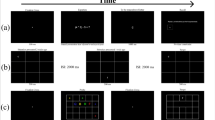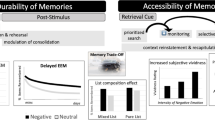Abstract
Rational
Previous research has suggested that long-term verbal declarative memory is particularly sensitive to enhancement by glucose loading; however, investigation of glucose effects on certain memory domains has hitherto been neglected. Therefore, domain specificity of glucose effects merits further elucidation.
Objectives
The aim of the present research was to provide a more comprehensive investigation of the possible effects of glucose administration on different aspects of memory by 1) contrasting the effect of glucose administration on different memory domains (implicit/explicit memory; verbal/non-verbal memory, and recognition/familiarity processes), 2) investigating whether potential effects on memory domains differ depending on the dose of glucose administered (25 g versus 60 g), 3) exploring the duration of the glucose facilitation effect (assessment of memory performance 35 min and 1 week after encoding).
Methods
A double-blind between-subjects design was used to test the effects of administration of 25 and 60 g glucose on memory performance.
Results
Implicit memory was improved following administration of 60 g of glucose. Glucose supplementation failed to improve face recognition performance but significantly improved performance of word recall and recognition following administration of 60 g of glucose. However, effects were not maintained 1 week following encoding.
Conclusions
Improved implicit memory performance following glucose administration has not been reported before. Furthermore, the current data tentatively suggest that level of processing may determine the required glucose dosage to demonstrate memory improvement and that higher dosages may be able to exert effects on memory pertaining to both hippocampal and non-hippocampal brain regions.

Similar content being viewed by others
References
Aggleton J, Brown M (1999) Episodic memory, amnesia, and the hippocampal–anterior thalamic axis. Behav Brain Sci 22:425–444
Allison T, Ginter H, McCarthy G, Nobre AC, Puce A, Luby M, Spencer DD (1994) Face recognition in human extrastriate cortex. J Neurophysiol 71(2):821–825
Azari N (1991) Effects of glucose on memory processes in young adults. Psychopharmacology 105:521–524
Ebbinghaus H (1885) Über das Gedächtnis. Leipzig; Dunker (Translation by Ruyer, H., Bussenius, C.E. (1913)). Teachers College, Columbia University, New York
Eichenbaum H, Otto T, Cohen N (1994) Two functional components of the hippocampal memory system. Behav Brain Sci 17:449–517
Foster J, Lidder P, Sünram S (1998) Glucose and memory: fractionation of enhancement effects? Psychopharmacology 137:259–270
Hoyland A, Lawton C, Dye L (2008) Acute effects of macronutrient manipulations on cognitive test performance in healthy young adults: a systematic research review. Neurosci Biobehav Rev 32:72–85
Jonides J, Smith EE, Koeppe RA, Awh E, Minoshima S, Mintun MA (1993) Spatial working-memory in humans as revealed by PET. Nature 363:623–625
Keane M, Gabrieli J, Fennema A, Growdon J, Corkin S (1991) Evidence for a dissociation between perceptual and conceptual priming in alzheimer’s disease. Behav Neurosci 105:326–342
Manning C, Parsons M, Cotter E, Gold P (1997) Glucose effects on declarative and nondeclarative memory, in healthy elderly and young adults. Psychobiology 25:103–108
McEwen B, Reagan L (2004) Glucose transporter expression in the central nervous system: relationship to synaptic function. Eur J Pharmacol 490:13–24
McGaugh J, Cahill L, Roozendaal B (1996) Involvement of the amygdala in memory storage: interaction with other brain systems. Proc Natl Acad Sci USA 93:13508
McGeorge P, Burton A (1990) Semantic processing in an incidental learning task. Q J Exp Psychol A 42:597–609
Messier C (2004) Glucose improvement of memory: a review. Eur J Pharmacol 490:33–57
Metzger M (2000) Glucose enhancement of a facial recognition task in young adults. Physiol Behav 68:549–553
Metzger M, Flint R (2003) Glucose enhancement of face recognition is unaffected by alterations of face features. Neurobiol Learn Mem 80:172–175
Nyberg L, Mclntosh AR, Houle S, Nilsson L-G, Tulving E (1996) Activation of medial temporal structures during episodic memory retrieval. Nature 380:715–717
Packard M (2009) Anxiety, cognition, and habit: a multiple memory systems perspective. Brain Res 1293:121–128
Packard M, White N (1990) Lesions of the caudate nucleus selectively impair “reference memory” acquisition in the radial maze. Behav Neural Biol 53:39–50
Packard M, Hirsh R, White N (1989) Differential effects of fornix and caudate nucleus lesions on two radial maze tasks: evidence for multiple memory systems. J Neurosci 9:1465
Rajaram S (1993) Remembering and knowing: two means of access to the personal past. Mem Cogn 21:89–89
Riby L (2004) The impact of age and task domain on cognitive performance: a meta-analytic review of the glucose facilitation effect. Brain Impairment 5:145–165
Scholey A, Kennedy D (2004) Cognitive and physiological effects of an “energy drink”: an evaluation of the whole drink and of glucose, caffeine and herbal flavouring fractions. Psychopharmacology 176:320–330
Scholey A, Harper S, Kennedy D (2001) Cognitive demand and blood glucose. Physiol Behav 73:585–592
Scholey A, Laing S, Kennedy D (2006) Blood glucose changes and memory: effects of manipulating emotionality and mental effort. Biol Psychol 71:12–19
Scholey A, Sünram-Lea S, Greer J, Elliott J, Kennedy D (2009) Glucose administration prior to a divided attention task improves tracking performance but not word recognition: evidence against differential memory enhancement? Psychopharmacology 202:549–558
Squire L, Zola-Morgan S (1991) The medial temporal lobe memory system. Science 253:1380
Sünram-Lea S, Foster J, Durlach P, Perez C (2001) Glucose facilitation of cognitive performance in healthy young adults: examination of the influence of fast-duration, time of day and pre-consumption plasma glucose levels. Psychopharmacology 157:46
Sünram-Lea S, Foster J, Durlach P, Perez C (2002a) The effect of retrograde and anterograde glucose administration on memory performance in healthy young adults. Behav Brain Res 134:505–516
Sünram-Lea S, Foster J, Durlach P, Perez C (2002b) Investigation into the significance of task difficulty and divided allocation of resources on the glucose memory facilitation effect. Psychopharmacology 160:387–397
Sünram-Lea S, Foster J, Durlach P, Perez C (2004) The influence of fat co-administration on the glucose memory facilitation effect. Nutr Neurosci 7:21–32
Sünram-Lea S, Dewhurst S, Foster J (2008) The effect of glucose administration on the recollection and familiarity components of recognition memory. Biol Psychol 77:69–75
Sünram-Lea S, Owen L, Finnegan Y, Hu H (2010) Dose-response investigation into glucose facilitation of memory performance and mood in healthy young adults. Journal of Psychopharmacology (in press. doi:10.1177/0269881110367725)
Tulving E, Schacter D (1990) Priming and human memory systems. Science 247:301
Watson G, Craft S (2008) Insulin resistance alzheimer’s disease: pathophysiology and treatment. Prog Neurother Neuropsychopharmacol 3:85–110
White N (1991) Peripheral signalling of the brain: role in neural-immune interactions, learning and memory. Hogrefe and Huber, Toronto, pp 421–443
Acknowledgement
GlaxoSmithKline (GSK) funded this project as part of a PhD programme.
Author information
Authors and Affiliations
Corresponding author
Rights and permissions
About this article
Cite this article
Owen, L., Finnegan, Y., Hu, H. et al. Glucose effects on long-term memory performance: duration and domain specificity. Psychopharmacology 211, 131–140 (2010). https://doi.org/10.1007/s00213-010-1876-x
Received:
Accepted:
Published:
Issue Date:
DOI: https://doi.org/10.1007/s00213-010-1876-x




